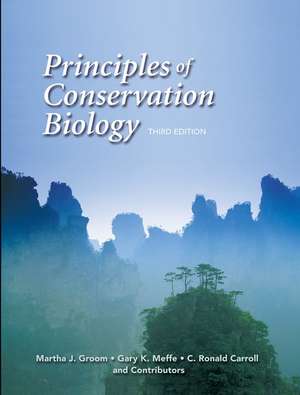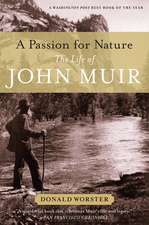Principles of Conservation Biology
Autor Martha J. Groom, Gary K. Meffe, C. Ronald Carrollen Limba Engleză Paperback – 5 aug 2005
Preț: 1042.21 lei
Preț vechi: 1427.69 lei
-27% Nou
Puncte Express: 1563
Preț estimativ în valută:
199.43€ • 208.64$ • 165.66£
199.43€ • 208.64$ • 165.66£
Carte disponibilă
Livrare economică 12-26 martie
Preluare comenzi: 021 569.72.76
Specificații
ISBN-13: 9780878935970
ISBN-10: 0878935975
Pagini: 816
Ilustrații: 264 Illustrations
Dimensiuni: 277 x 216 x 41 mm
Greutate: 2.22 kg
Ediția:Revizuită
Editura: Oxford University Press
Colecția OUP USA
Locul publicării:New York, United States
ISBN-10: 0878935975
Pagini: 816
Ilustrații: 264 Illustrations
Dimensiuni: 277 x 216 x 41 mm
Greutate: 2.22 kg
Ediția:Revizuită
Editura: Oxford University Press
Colecția OUP USA
Locul publicării:New York, United States
Recenzii
The preface also calls attention to the multiple voices that are represented by the many diverse contributors to the volume. These voices blend together incredibly well, and although they speak to different topics, they combine to produce an integrated whole. The result is more than an outstanding textbook for advanced undergraduates and beginning graduate students. It is also a state-of-the-art reference for anyone seeking an authoritative introduction to the weighty subject of conservation biology.
I would like to recommend this book not only to teachers of conservation or their students, but also to other biologists, ecologists, and of course to people responsible for developing political instruments that accompany the ecological view on biodiversity conservation.
I would like to recommend this book not only to teachers of conservation or their students, but also to other biologists, ecologists, and of course to people responsible for developing political instruments that accompany the ecological view on biodiversity conservation.
Notă biografică
Martha J. Groom is an Associate Professor in the Interdisciplinary Arts and Sciences program at the University of Washington, Bothell and the Department of Biology, University of Washington, Seattle. She teaches conservation biology, ecology, landscape planning and topical courses on science, policy, and society. She has won several teaching awards. Her research focuses on the influences of fragmentation and landscape context on species persistence.Gary K. Meffe is an Adjunct Professor in the Department of Wildlife Ecology and Conservation at the University of Florida. He is senior author of Ecosystem Management: Adaptive, Community-Based Conservation, coauthor of Conserving Biodiversity on Military Lands: A Handbook for Natural Resources Managers, and coeditor of Ecology and Evolution of Livebearing Fishes. Since 1997 he has served as Editor of the international journal Conservation Biology.C. Ronald Carroll is the former Director of the Institute of Ecology at the University of Georgia and currently the Director for Science in the River Basin Science and Policy Center at the University of Georgia. He is the series editor for the newly initiated Southern Environment Series of the UGA Press. He teaches conservation ecology and conducts research on invasive species in the southeastern United States. He is also engaged in a large conservation and sustainable development project in Ecuador known as the Chocó-Andean Corridor Project. The project is located in northwestern Ecuador and embraces two globally significant hotspots of biological diversity, the Chocó and the Western Andean slopes.







